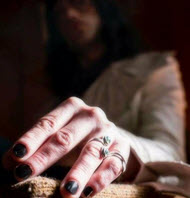Bohemian Rhapsody
 for thematic elements, suggestive material, drug content and language.
for thematic elements, suggestive material, drug content and language.
Reviewed by: Samiatu Dosunmu
CONTRIBUTOR
| Moral Rating: | Extremely Offensive |
| Moviemaking Quality: |
|
| Primary Audience: | Adults |
| Genre: | Biography Music Drama |
| Length: | 2 hr. 14 min. |
| Year of Release: | 2018 |
| USA Release: |
November 2, 2018 (wide—4,000+ theaters) DVD: February 12, 2019 |






What happens when people live a hedonistic lifestyle?
What is SEXUAL IMMORALITY? Answer
SEXUAL LUST—Why does God strongly warn us about lustfulness outside of marriage? Answer
PURITY—Should I save sex for marriage? Answer
TEMPTATIONS—How can I deal with temptations? Answer
CONSEQUENCES—What are the consequences of sexual immorality? Answer
Cross-dressing
GAY—What’s wrong with being Gay? Answer
Homosexual behavior versus the Bible: Are people born Gay? Does homosexuality harm anyone? Is it anyone’s business? Are homosexual and heterosexual relationships equally valid?
What about Gays needs to change? Answer
It may not be what you think.
Read stories about those who have struggled with homosexuality

Freddie Mercury’s death as a result of contracting HIV which resulted in AIDS



| Featuring |
|---|
|
Rami Malek … Freddie Mercury (birthname: Farrokh Bulsara)—lead vocalist of the rock band Queen Aaron McCusker … Jim Hutton—one of Mercury’s male partners Lucy Boynton … Mary Austin Joseph Mazzello … John Deacon Mike Myers … Ray Foster Ben Hardy … Roger Taylor Aidan Gillen … John Reid Gwilym Lee … Brian May Tom Hollander … Jim Beach Allen Leech … Paul Prenter Jess Radomska … Cheryl See all » |
| Director |
|
Bryan Singer—“X-Men: Apocalypse,” “X-Men: First Class,” “Superman Returns,” “X-Men” 1-2, “House M.D.” TV series |
| Producer |
|
GK Films [Great Britain] New Regency Pictures Queen Films Ltd. [Great Britain] See all » |
| Distributor |
“Bohemian Rhapsody” traces the rock band Queen from its humble beginnings in 1970, in London, to their legendary performance at Live Aid at Wembley Stadium in 1985. Intertwined within the band’s coming-of-age story is the life of their front lead vocalist Freddie Mercury (né Farrokh Bulsara, played by Rami Malek).
Freddie Bulsara (he changed his surname to Mercury in 1971) first meets Brian May (Gwilym Lee—guitarist) and Roger Taylor (Ben Hardy—drummer), then part of a band named Smile, in a nightclub parking lot after a performance. Their lead vocalist Tim Staffell (Jack Roth), had quit after their performance. When Freddie finds this out, he offers to replace him as lead vocalist, securing the future of the band.
Roger initially declines his offer and points out Freddie’s teeth. Hurt by the comment, Freddie begins to sing and then responds “I was born with additional incisors. More space in my mouth means more range.” Aware that both Roger and Brian are impressed by his singing ability, he sarcastically spins his offer around by adding, “I’ll consider your offer.” Brian and Roger agree to make him a part of the group.
With the addition of bassist John Deacon (Joseph Mazzello—bass guitarist), the band sells their van and use the money to record an album. It is also during that time that Freddie renames the band Queen “because of her royal highness, because it’s outrageous, because I cannot think of anyone more outrageous than me.”
Queen is discovered and, due to their musical style, sign with EMI records. They are managed by John Reid (Aidan Gillen) and embark on an U.S. tour to promote their debut album entitled “Queen.” During the tour, Freddie begins to question his sexuality and eventually admits to his girlfriend Mary (Lucy Boynton) that he is bisexual.
Freddie’s ongoing struggles with his sexuality, drug use, and narcissistic tendencies creat dysfunction within the band to the point of nearly destroying it, along with their friendships. When Freddie is diagnosed with AIDS, he realizes his self-worth, “I decide who I am. I’m going to be who I was born to be, a performer, give the people what they want.” He seeks forgiveness from those he wronged and abused. The band decides to use Live Aid as a comeback performance and as a means to reconcile with each other and continue as a united family.
Spiritual Issues
Boundaries
In Father Mike Schmitz’s recent vlog “Ascension presents: Why we need Boundaries,” he cautions followers of Christ: “The only way you will continue to keep serving the people around you is if you establish boundaries.”
Queen saw itself as,
“four misfits who don’t belong together, playing for other misfits. To the outcasts right at the back of the room who’re pretty sure they don’t belong either. We belong to them. We are a family with no two as the same.”
However, there was often dysfunction within the group. The dysfunction led to arguments, conflict, bitterness, and resentment. As the band gained notoriety and fame, Freddie developed a narcissistic attitude, and made decisions for the band without consultation. He even went so far as to insinuate that he was the most talented out of the four and without him, Queen would not have risen to superstardom.
When the band discussed Freddie’s narcissistic tendencies with him, he reacted by becoming more aggressive and controlling. Eventually members of the band remained quiet, opting to condone his behaviour to avoid conflict. In Drs. Henry Cloud and John Townsend’s book Boundaries, dysfunctional families are known to feature a certain type of boundary problem called triangulation.
“Person A is angry at Person B.
Person A does not tell Person B.
Person A calls Person C and gripes about Person B.
Person C enjoys Person A’s confidence and listens whenever A wants to play the triangle game.”
It is plausible that Freddie did not know how deal with conflict. This can be attributed to his Zoroastrianism background. His father raised him to exercise this religion’s core values: good thoughts, words, and deeds. But Freddie viewed conflict as a negative and would often become defensive or even more aggressive/controlling, because, as Drs. Henry Cloud and John Townsend theorize, “such a person has never received training in delaying gratification and in taking responsibility for himself/herself.”
We should never be afraid to establish boundaries. Without boundaries, we can easily fall into gossip or refuse to love the way Christ loves us. Dietrich Bonhoeffer explains that Christ established boundaries with us when he died on the cross for our sins. This sacrifice is not to be taken lightly or sold as a form of cheap grace — “the grace which amounts to the justification of sin without the justification of the repentant sinner who departs from sin and from whom sin departs.”
Self-Esteem
“For as in one body we have the same function, so we, though many, are one body in Christ and individually members one of another.” —Romans 12:4-5
In RBC Ministries’ essay entitled “Self-Esteem: What does the Bible say?”, the author argues that Paul wanted readers to think of themselves as people who are mutually reliant on one another’s strength. Queen’s style and sound provided an outlet for Freddie to discover who he was. He wore outrageous outfits, people suspected he wore women’s clothing, on and off stage, used a baseless microphone as a prop during his stage performance, and moved around on stage in ballet jazz-like movements. Brian May and Roger Taylor shared in interviews that Freddie was extremely insecure about his teeth and that his larger than life persona was an act to distract the crowd from his mouth. Freddie could have had dental surgery, but decided against it, because it could affect his vocal chords and octave range.
As for the other members, Bryan had an outlet to create, arguably, some of the best guitar rifts of all time, while Roger used creative and experimental ways to showcase his drumming skills. Sadly, the film does not elaborate too much on bassist John Deacon’s skills. In real life, John retreated after Freddie’s passing. It is clear, however, that the band appreciated each other’s individuality.
Freddie believed that he could do whatever he wanted. After experiencing health issues and that the people around him do not have his best interest, he begins to realize he has turned rotten to the core. “You know when you’ve gone rotten? Fruit flies coming to feast on what is left.” Scripture tells us that doing what we want is a temporary feeling.
“We do not dare to classify or compare ourselves with some who commend themselves. When they measure themselves by themselves and compares with themselves, they are not wise. —2 Corinthians 10:12, 18 NIV
Realizing the depth of his loneliness, he begins to make amends with the group after they take a temporary hiatus.
Accuracy about Freddie Mercury’s AIDS diagnosis
C.S. Lewis wrote, “I’ve got nothing that I hadn’t bargained for. Of course, it is different when the thing happens to oneself, not to others, and in reality, not imagination.”
In order to tie in Queen’s performance at Live Aid, a benefit concert that was organized by Bob Geldof in 1985 to help with the famine in Ethiopia, the film shifted Freddie’s AIDS diagnosis to 1985. His actual diagnosis was in 1987. How Freddie contracted the virus is unknown to this day. When Freddie found out his prognosis, he told the people he was closest to. He confirmed his diagnosis to the public 24-hours before his death in 1991.
Loving others
In Tim Tebow’s This Is the Day, he explores what it means to love others. Although God condemns sin,
“He does not call us by our sins but by our name.”
As Christians, we often focus on the obvious sin (i.e., homosexuality, murder, etc.), forgetting that Jesus loved humanity enough to die on the cross for every sin
Freddie Mercury led a very private life. Much of what was said about him was speculation. The people who knew him best respected his privacy. To the world, he represented the LGBTQ+ community that is often stigmatized. Regardless, for Christians, loving others is not an option. Jesus stated:
“So now I am giving you a new commandment: Love each other. Just as I have loved you, you should love each other.” —John 13:34
Tim Tebow says, “As hard as it may be to love certain people, it’s much easier to when we ask God to help us see them the way He does.” As a Christian, I, personally, agree.
Filmmaking quality
As a new
CONTRIBUTOR
- Drugs/Alcohol: Heavy— • Open drug use and paraphernalia
- Sex: • unmarried couple having sex (not graphic) • sexual comments and actions related to heterosexual fornication, homosexuality and bisexuality • gay club scene • cross dressing • evidence of man-man sexual relationships, including men kissing, fondling, inappropriate touching between two men, and implied fornication • sexual song lyrics
- Profane language: Heavy— • “Chr*st” (2) • “J*sus” • “G*d” • “H*ll” (3) • “d*mn” • “Speaking in bloody tongues if we have to”
- Vulgar/Crude language: Heavy— • “f*cking” • “Tell him his daughter is an epic shag” (sexual) • “I pity your wife if you think 6 minutes is forever” • pr*ck • “That thing between your legs… does it bite?” • “p*ss-flop” • p*ss-faced • p*sswad Paki • “Do you mind p*ssing off?” • “n*ts” • b*lls (2) • b*llocks (3) • w*nkers (2) • p*cker (i.e., p*nis) • bloody (6) • b*tchy • “screw 'em” • “fag” • “a**hole” (5) • “a**” (2) • s-words (7) • “My throat feels like a vulture’s crotch”
- Nudity: Moderately Heavy— • brief scene showing what looked like the aftermath of an orgy • male nude except for briefs • Semi-nude performances • shirtless males • woman walking around in a shirt, no bra, nipples shown and only underwear
- Violence: Minor
See list of Relevant Issues—questions-and-answers.


A few warnings: There are two homosexual kisses, neither more than 5 seconds, but still uncomfortable to watch. There is premarital sex, drug usage, and plenty of language. (One F word, a ton of S-words, GD, b-words, etc.) I wouldn’t recommend it for teenagers, or the easily offended. But I did truly enjoy the music, and learning more about someone so influential to rock and roll.
Moral rating: Very Offensive / Moviemaking quality: 5
Moral rating: Average / Moviemaking quality: 4
He then is attracted to both sexes, possibly because he didn’t have a good, loving relationship with his parents. Though, when he introduced his partner near the end to his parents, they did not bash him for what he had done. They still loved him and were sad for him, maybe questioning what they did and did not do. In the end of the movie and after watching interviews of him near his death, I could tell he was still lost. Still looking for himselfSee all »
Moral rating: Average / Moviemaking quality: 5
PLEASE share your observations and insights to be posted here.


Freddie is proud of his sins, too. “I don’t have time to be their AIDS poster boy, their cautionary tale,” he says. “I decide what I’m going to be.”… Maybe he should have thought of that before he shut the bedroom door… The irony is that he willingly became what he said he didn’t want to become.
A completely eye-rolling moment is when it is stated that Freddie wouldn’t be struggling with the consequences of his sex acts, if he had identified his homosexuality sooner…
Sure, Jan…
There was such a great opportunity to expose the sum of homosexual “sex” and sodomy… But, of course, Hollywood wouldn’t ever acknowledge that reality…
My Ratings: Moral rating: Extremely Offensive / Moviemaking quality: